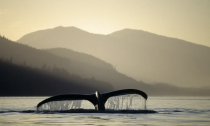
The endless impacts of climate change aren’t limited to one type of ecosystem. Although many reports about climate change focus on how it affects human lives, how does climate change affect the biodiversity of marine ecosystems? Here’s the latest news on climate change and marine life, explained.
According to a 2020 report by the National Oceanic and Atmospheric Administration (NOAA), over 90 percent of global warming in the past 50 years has been absorbed by the ocean. Oceans have a central role in the stabilization of Earth’s temperatures, so when they absorb more heat than necessary, the global imbalance becomes catastrophic. The warming of the ocean creates a rising sea level that hurts the survival of habitat-forming species such as sea grasses and mangroves, amongst other issues.
Most are familiar with the way rising sea levels are impacting the Arctic, especially regarding above-water species such as polar bears. However, the situation below the ice is just as dire. Scientific American reports that sea ice is an important habitat for Antarctic krill, a popular food source for creatures such as sea birds and mammals. As the sea ice melts, krill populations drop, leading to bigger biodiversity declines.
Algae, which is also essential to the Arctic food chain, has also declined due to rising global oceanic temperatures and, according to Conservation.org, is creating a chain effect in food scarcity and biodiversity decline. Additionally, rising temperatures have affected Arctic cod. Arctic cod contributes to food chains in both the animal and human diet, and a dramatic decrease in population could lead to food scarcity.
Those familiar with gorgeous coral reefs such as the Great Barrier Reef are probably also familiar with the process of coral bleaching, which occurs when the water is too warm. Coral reefs then expel algae living in their tissues, turning them white. It’s important to note that while coral can survive a bleaching event, these events put the corals under significant stress and mean they have a higher chance of mortality.
According to a research report via PNAS, global warming is also creating a “dip in species richness” close to the equator. This effectively means that the heat of the ocean near the equator is forcing species to expand the geographic range in which they live, even to less hospitable waters.
Even climate change-related events that happen outside of the ocean, such as erosion and flooding, directly impact marine ecosystems. Ocean & Climate Platform explains that erosion and flooding disturb coastal marine areas, often upsetting habitats such as seagrass beds, mangroves, and sea turtle nesting sites.
Although climate change and its impacts seem like a recent development, a fossil study published by Stanford warned scientists that the 21st century isn’t the first time biodiversity in marine ecosystems has declined. The report, which was on May 6, 2021, in Current Biology, suggests that a decline in biodiversity is not a new concept but a pattern that has existed for over 145 million years. Scientists analyzed geochemical data in marine mollusks for evidence.
As scientists learn more and more about the impacts of climate change on marine ecosystems, hopefully, they can develop a marine-specific plan to prevent further biodiversity loss.












Social Profiles